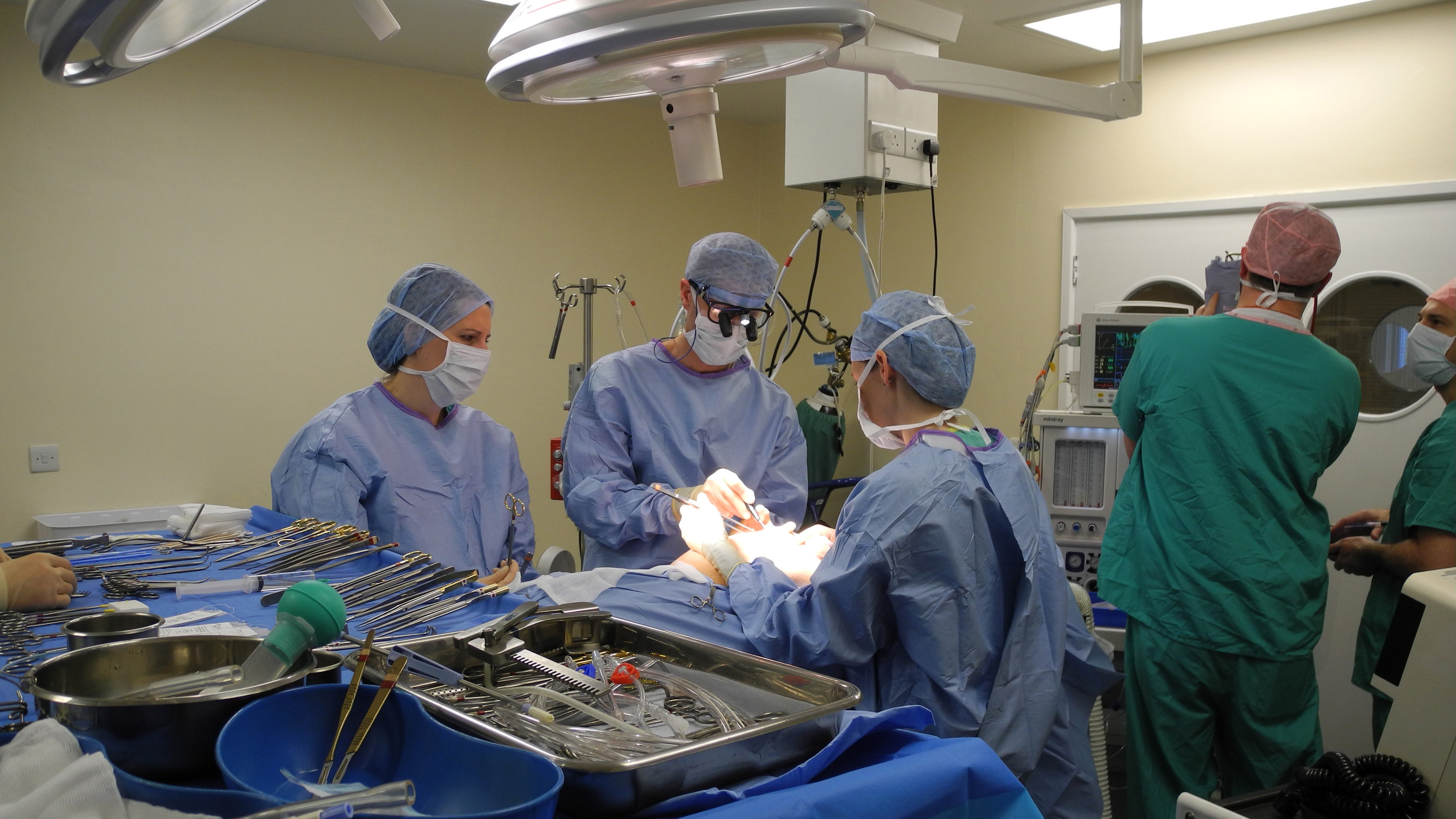Leading Veterinary Cardiothoracic Surgery Centre Expands
Europe’s leading centre for pet heart surgery, based at the RVC, has quadrupled its capacity to perform canine mitral valve surgeries by creating key new roles, funded by a donation.
As well as helping more dogs, the development enhances the opportunities available to both undergraduate students and postgraduate clinical residents at the RVC.
One of the most prevalent heart defects in dogs, mitral valve disease is still primarily managed medically, though for humans with mitral valve leakage, surgery is the standard therapy. The RVC is one of a few centres in the world to perform the procedure on dogs.
Dan Brockman, Professor of Small Animal Surgery, first performed open heart surgery at the RVC in 2005, and has worked alongside human cardiac surgeons and overseas veterinary surgeons to expand what the RVC can offer its clients.

The three new roles are Cardiothoracic Surgery Fellow, Cardiothoracic Perfusion Fellow and Cardiothoracic Theatre Nurse and Surgery Coordinator. The development enables RVC Small Animal Referrals to dedicate more time to screen animals to establish which dogs are good candidates for surgery, and to create a more structured mechanism for post-operative follow-up care.
The roles have been funded by The Tailwaggers Trust. The Trust was a long-term supporter of the RVC, dating back to the 1930s, but it sadly ceased operations last year. A previous donation will fund the three new roles for the first two years. The development should enable the number of surgeries for mitral valve disease at the RVC to increase from around one each month to one a week ultimately, should demand exist.
Commenting on the scale of the problem of canine mitral valve disease and the benefits of making surgery available to more dogs, Professor Brockman said: “We are very keen to take all sorts of both congenital and acquired heart defects but what we suspected, and what has been shown quite clearly, is the number of dogs with mitral valve disease out there is huge. Therefore the demand for surgery is similarly very high. In humans, a leaking mitral valve is a not a medical condition at all but a surgical condition. Now that we can offer surgery then some of these dogs that have had a bout of heart failure, and we would expect to pass away within a year, can have a much better quality of life as well as a longer life.
“Not only can we offer a better quality of life for the dogs, as it improves their ability to exercise, we can also offer a better quality of life for owners. Owners of dogs with mitral valve disease often have had to change their lifestyle to make sure they can give the dog the medication it requires at the necessary time intervals. Therefore, if we can reduce the number of medications and the frequency of medications that these animals receive, then the owners really benefit as well.”
Alluding to the surgical challenges, Professor Brockman added: “Performing a repair of the mitral valve is not a straightforward thing. There’s a very steep learning curve and each patient is slightly different. Simplistically, taking a diseased valve out and replacing it with an artificial valve that we know works perfectly well would be a much easier thing to do than attempting to repair a valve. The problem is that dogs don’t tolerate artificial valves very well at all, in fact they form blood clots on them very quickly.
“Therefore we repair the valve, using a combination of techniques – some of which replace the suspensory apparatus (chordae tendinee) of the valve with some Gore-Tex suture material. The other component is to place an annuloplasty to bring the enlarged valve annulus down to a normal size so the valve leaflets can meet properly.”
In terms of educational benefits, undergraduates will see more dogs with mitral valve disease and, as a result, gain a better understanding of how to treat it medically. Postgraduate residents will be exposed to the advanced cardiology aspects, the advanced surgical aspects and the critical care components these animals need, which will develop key transferable clinical skills.
For more information about heart surgery at the RVC see Veterinary Cardiology.
Press Office Contact
Uche Graves / Zoe White
T: 0800 368 9520
E: uche.graves@plmr.co.uk / zoe.white@plmr.co.uk
Notes to Editors
The Royal Veterinary College (RVC) is the UK's largest and longest established independent veterinary school and is a constituent College of the University of London. The RVC offers undergraduate, postgraduate and CPD programmes in veterinary medicine, veterinary nursing and biological sciences, being ranked in the top 10 universities nationally for biosciences degrees. It is currently the only veterinary school in the world to hold full accreditation from AVMA, EAEVE, RCVS and AVBC.
A research-led institution, in the most recent Research Excellence Framework (REF2014) the RVC maintained its position as the top HEFCE funded veterinary focused research institution.
The RVC also provides animal owners and the veterinary profession with access to expert veterinary care and advice through its teaching hospitals; the Beaumont Sainsbury Animal Hospital in central London, the Queen Mother Hospital for Animals (Europe's largest small animal referral centre), the Equine Referral Hospital, and the Farm Animal Clinical Centre located at the Hertfordshire campus.
RVC Press Release 6 April 2017
See other Press Releases.

